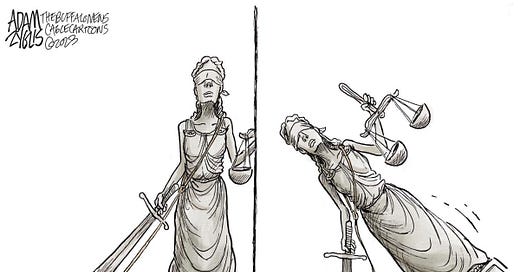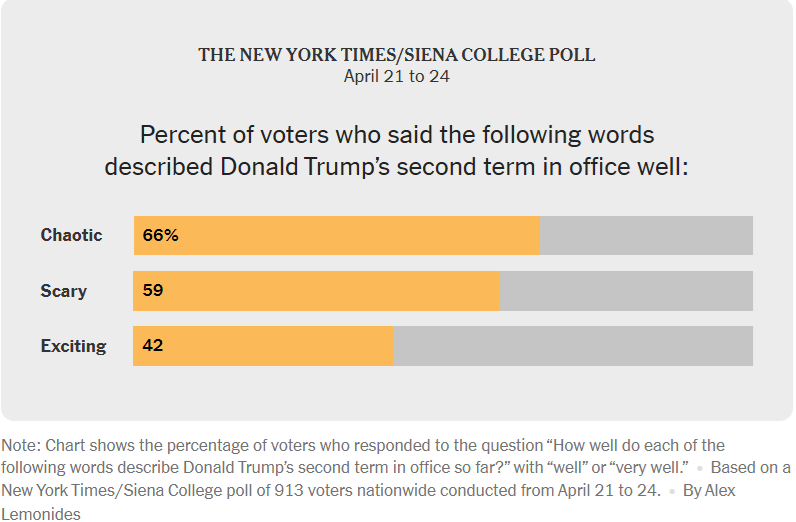Rather than writing any particular post today, I thought I would share in full a couple of writings that I have read recently, that I hope everyone will take the time to read.
UNITED STATES COURT OF APPEALS FOR THE FOURTH CIRCUIT
KILMAR ARMANDO ABREGO GARCIA
vs.
KRISTI NOEM; TODD LYONS; KENNETH GENALO; NIKITA BAKER; PAMELA JO BONDI; MARCO RUBIO
Upon review of the government’s motion, the court denies the motion for an emergency stay pending appeal and for a writ of mandamus. The relief the government is requesting is both extraordinary and premature. While we fully respect the Executive’s robust assertion of its Article II powers, we shall not micromanage the efforts of a fine district judge attempting to implement the Supreme Court’s recent decision.
It is difficult in some cases to get to the very heart of the matter.
But in this case, it is not hard at all. The government is asserting a right to stash away residents of this country in foreign prisons without the semblance of due process that is the foundation of our constitutional order. Further, it claims in essence that because it has rid itself of custody that there is nothing that can be done.
This should be shocking not only to judges, but to the intuitive sense of liberty that Americans far removed from courthouses still hold dear.
The government asserts that Abrego Garcia is a terrorist and a member of MS-13. Perhaps, but perhaps not. Regardless, he is still entitled to due process. If the government is confident of its position, it should be assured that position will prevail in proceedings to terminate the withholding of removal order. See 8 C.F.R. § 208.24(f) (requiring that the government prove “by a preponderance of evidence” that the alien is no longer entitled to a withholding of removal). Moreover, the government has conceded that Abrego Garcia was wrongly or “mistakenly” deported. Why then should it not make what was wrong, right?
The Supreme Court’s decision remains, as always, our guidepost. That decision rightly requires the lower federal courts to give “due regard for the deference owed to the Executive Branch in the conduct of foreign affairs.” Noem v. Abrego Garcia, No. 24A949, slip op. at 2 (U.S. Apr. 10, 2025); see also United States v. Curtiss-Wright Exp. Corp., 299
U.S. 304, 319 (1936). That would allow sensitive diplomatic negotiations to be removed from public view. It would recognize as well that the “facilitation” of Abrego Garcia’s return leaves the Executive Branch with options in the execution to which the courts in accordance with the Supreme Court’s decision should extend a genuine deference. That decision struck a balance that does not permit lower courts to leave Article II by the wayside.
The Supreme Court’s decision does not, however, allow the government to do essentially nothing.
It requires the government “to ‘facilitate’ Abrego Garcia’s release from custody in El Salvador and to ensure that his case is handled as it would have been had he not been improperly sent to El Salvador.” Abrego Garcia, supra, slip op. at 2. “Facilitate” is an active verb. It requires that steps be taken as the Supreme Court has made perfectly clear. See Abrego Garcia, supra, slip op. at 2 (“[T]he Government should be prepared to share what it can concerning the steps it has taken and the prospect of further steps.”). The plain and active meaning of the word cannot be diluted by its constriction, as the government would have it, to a narrow term of art. We are not bound in this context by a definition crafted by an administrative agency and contained in a mere policy directive. Cf. Loper Bright Enters. v. Raimondo, 603 U.S. 369, 400 (2024); Christensen v. Harris Cnty., 529 U.S. 576, 587 (2000). Thus, the government’s argument that all it must do is “remove any domestic barriers to [Abrego Garcia’s] return,” Mot. for Stay at 2, is not well taken in light of the Supreme Court’s command that the government facilitate Abrego Garcia’s release from custody in El Salvador.
“Facilitation” does not permit the admittedly erroneous deportation of an individual to the one country’s prisons that the withholding order forbids and, further, to do so in disregard of a court order that the government not so subtly spurns.
“Facilitation” does not sanction the abrogation of habeas corpus through the transfer of custody to foreign detention centers in the manner attempted here. Allowing all this would “facilitate” foreign detention more than it would domestic return. It would reduce the rule of law to lawlessness and tarnish the very values for which Americans of diverse views and persuasions have always stood.
The government is obviously frustrated and displeased with the rulings of the court. Let one thing be clear. Court rulings are not above criticism. Criticism keeps us on our toes and helps us do a better job. See Cooper v. Aaron, 358 U.S. 1, 24 (1958) (Frankfurter, J., concurring) (“Criticism need not be stilled. Active obstruction or defiance is barred.”). Court rulings can overstep, and they can further intrude upon the prerogatives of other branches. Courts thus speak with the knowledge of their imperfections but also with a sense that they instill a fidelity to law that would be sorely missed in their absence.
“Energy in the [E]xecutive” is much to be respected. FEDERALIST NO. 70, at 423 (1789) (Alexander Hamilton) (Clinton Rossiter ed., 1961). It can rescue government from its lassitude and recalibrate imbalances too long left unexamined. The knowledge that executive energy is a perishable quality understandably breeds impatience with the courts. Courts, in turn, are frequently attuned to caution and are often uneasy with the Executive Branch’s breakneck pace.
And the differences do not end there. The Executive is inherently focused upon ends; the Judiciary much more so upon means. Ends are bestowed on the Executive by electoral outcomes. Means are entrusted to all of government, but most especially to the Judiciary by the Constitution itself.
The Executive possesses enormous powers to prosecute and to deport, but with powers come restraints. If today the Executive claims the right to deport without due process and in disregard of court orders, what assurance will there be tomorrow that it will not deport American citizens and then disclaim responsibility to bring them home?* And what assurance shall there be that the Executive will not train its broad discretionary powers upon its political enemies? The threat, even if not the actuality, would always be present, and the Executive’s obligation to “take Care that the Laws be faithfully executed” would lose its meaning. U.S. CONST. art. II, § 3; see also id. art. II, § 1, cl. 8.
Today, both the United States and the El Salvadoran governments disclaim any authority and/or responsibility to return Abrego Garcia. See President Trump Participates in a Bilateral Meeting with the President of El Salvador, WHITE HOUSE (Apr. 14, 2025). We are told that neither government has the power to act. The result will be to leave matters generally and Abrego Garcia specifically in an interminable limbo without recourse to law of any sort.
The basic differences between the branches mandate a serious effort at mutual respect. The respect that courts must accord the Executive must be reciprocated by the Executive’s respect for the courts. Too often today this has not been the case, as calls for impeachment of judges for decisions the Executive disfavors and exhortations to disregard court orders sadly illustrate.
* See, e.g., Michelle Stoddart, ‘Homegrowns are Next’: Trump Doubles Down on Sending American ‘Criminals’ to Foreign Prisons, ABC NEWS (Apr. 14, 2025, 6:04 PM); David Rutz, Trump Open to Sending Violent American Criminals to El Salvador Prisons, FOX NEWS (Apr. 15, 2025, 11:01 AM EDT).
It is in this atmosphere that we are reminded of President Eisenhower’s sage example. Putting his “personal opinions” aside, President Eisenhower honored his “inescapable” duty to enforce the Supreme Court’s decision in Brown v. Board of Education II to desegregate schools “with all deliberate speed.” Address by the President of the United States, Delivered from his Office at the White House 1-2 (Sept. 24, 1957); 349 U.S. 294, 301 (1955). This great man expressed his unflagging belief that “[t]he very basis of our individual rights and freedoms is the certainty that the President and the Executive Branch of Government will support and [e]nsure the carrying out of the decisions of the Federal Courts.” Id. at 3. Indeed, in our late Executive’s own words, “[u]nless the President did so, anarchy would result.” Id.
Now the branches come too close to grinding irrevocably against one another in a conflict that promises to diminish both. This is a losing proposition all around. The Judiciary will lose much from the constant intimations of its illegitimacy, to which by dent of custom and detachment we can only sparingly reply. The Executive will lose much from a public perception of its lawlessness and all of its attendant contagions. The Executive may succeed for a time in weakening the courts, but over time history will script the tragic gap between what was and all that might have been, and law in time will sign its epitaph.
It is, as we have noted, all too possible to see in this case an incipient crisis, but it may present an opportunity as well. We yet cling to the hope that it is not naïve to believe our good brethren in the Executive Branch perceive the rule of law as vital to the American ethos. This case presents their unique chance to vindicate that value and to summon the best that is within us while there is still time.
In sum, and for the reasons foregoing, we deny the motion for the stay pending appeal and the writ of mandamus in this case. It is so ordered.
For the Court
Thought for the day in honor of his birthday…
“Nations, like individuals, are punished for their transgressions.”
~ Ulysses S. Grant
Must Read Article:
GOVENOR JOSH SHAPIRO: FINDING MORAL CLARITY AFTER AN ARSONIST’S ATTACK (from the New York Times)
I woke up to yelling in the hallway.
A few seconds later, there was a bang on the door.
It was just after 2 a.m., and a state trooper in the hallway of our private living quarters at the governor’s residence said there was a fire in the building. We needed to evacuate immediately.
My wife, Lori, and I ran to the bedrooms where our kids and two dogs were sleeping. We got them up quickly and followed the trooper down a back stairwell to the driveway.
At that point, standing in the cold, damp air, knowing that all the kids were accounted for, we began to wonder what had happened.
We thought it must be some kind of accident — perhaps a candle had been left burning and tipped over, something had short-circuited or there had been a malfunction in the kitchen.
But once the fire was extinguished — and firefighters were tackling the last few hot spots — the chief of the Harrisburg Bureau of Fire took me back inside to see the damage.
As I walked through the doorway, my nose burned from the smell of smoke. It was eerily quiet, but I could hear water dripping from the ceiling. My feet sloshed on the soaked floor.
The beautiful state dining room — where my family and I celebrated our Passover Seder with family and community just a few hours earlier — was completely destroyed.
Windows were smashed in, and there was glass everywhere. Some tables were turned over, and others had just melted away. Artwork from the New Deal era that had hung on display for visitors to enjoy had disintegrated into the walls. Plates we had eaten our Seder dinner on were broken and covered in soot. The Haggadah — our prayer book for the Seder — was burned so badly, only a few short lines of text were recognizable.
The devastation was shocking, and to me, it did not appear to be an accident. The damage was too extreme. It looked like a bomb had gone off in the middle of our home.
As I looked around in horror, I found myself picturing where each of my kids and our guests sat the previous evening as we prayed and recounted the story of our ancestors escaping bondage thousands of years ago.
As we moved our family to a secure location, I began receiving updates from the Pennsylvania State Police on what had happened: I was told with certainty that the fire was a deliberate, targeted attack by an arsonist.
As we would learn in the coming days, the alleged arsonist had intended to beat me with the hammer he carried with him when he broke into the governor’s residence, had he found me there.
As our kids woke up that morning after a traumatic night, Lori and I thought it was important to tell them honestly what we knew and what we didn’t.
I was focused on being a good dad, a good husband and a good governor — in that order.
We shared with them that the fire hadn’t been an accident, that someone had done this intentionally.
That the police were searching for who did it. That we were safe where we were.
And that I was confident we would get the person — or people — who had done this.
We tried to be there for them and answer their questions as best we could.
And 13 hours after the arsonist invaded our home, I stood at the window that he had climbed through, receiving an update from the Pennsylvania State Police, and then made clear to the people of my state that nothing would deter me from doing my job — and nothing would deter me from practicing my faith openly and proudly.
And I meant it. After I concluded my remarks, I rejoined my family to celebrate our second Passover Seder.
That day, the police arrested the suspect, but as the investigation continued, people began to ascribe their own beliefs onto what they thought happened — and why.
I believe in the rule of law, and for the rule of law to work, prosecutors and law enforcement officials need to be able to do their jobs and investigate without fear, favor or political pressure. It is not my job to opine on what the motive was or what the charges should be.
As has become typical, people rushed to assert their uninformed opinions to get likes or make a headline or suit their own narrative, seeking some solace or validation that whatever motivated the arson suspect and his actions would suit their view of the world.
Ultimately, prosecutors will determine what motivated this act of violence, and we trust them to do their important work.
But as I said in Butler after the attempted assassination of Donald Trump and as I said in Altoona after the police captured the individual who has been charged with the murder of the UnitedHealthcare C.E.O., this type of violence has no place in our society, regardless of what motivates it.
It doesn’t matter if it’s coming from one side or the other, directed at one party or another or one person or another.
This level of violence has to stop. It is our shared responsibility to do better.
As elected leaders, we have an additional responsibility to speak and act with moral clarity. To not just call out what’s right and what’s wrong but also to do the hard work of bringing people together to find common ground in a world that’s constantly trying to divide us.
William Penn founded our commonwealth as a place where all would be welcome — a place of tolerance and understanding where people of different faiths could live together in peace.
This experience has made me more determined than ever to not only welcome people of all faiths back to the governor’s residence — where we’ve lit Christmas trees, held iftars and danced at a bar mitzvah — but also to do my part to address the political division and violence in America today.
On Thursday at the Harrisburg Bureau of Fire, an elderly man named John Wardle, the Christian chaplain from the Penn Township Volunteer Fire Department, gave me a letter signed by every member of his department. On the back of the letter, he had handwritten a prayer for our family, from Numbers 6:24- 26:
The Lord bless you and keep you; the Lord make his face shine on you and be gracious to you; the Lord turn his face toward you and give you peace.
I cried when I read this. Because it’s known to us as the priestly blessing, and it happens to be the same prayer that Lori and I have recited to each of our children every night in Hebrew before they go to bed for more than two decades:
יברכך יהוה וישמרך
יאר יהוה פניו אליך ויחנך
ישא יהוה פניו אליך וישם לך שלום
Moments like that have given us strength over the past week. The prayers, blessings and messages of support we’ve received have lifted us up and shown us the way forward in the wake of a traumatic event.
Those moments have served as yet another reminder of our common humanity. A recognition that there is far more that binds us together than divides us — no matter what those who stoke that division would have us believe.
I believe our political divide can be repaired. But our leaders must act with moral clarity and take their cues from the good people of this nation, who in times of tragedy always seem to find our better angels.
Quote of the day:
“The fundamental question, is whether Americans sufficiently value their freedom to stand up against autocracy.”
~Guy-Uriel Charles
What I’m reading…
But beyond the damaging policy changes, Trump is eroding something even deeper: our shared sense of American morality. At the top of this list is the continued incarceration of Kilmar Abrego Garcia in a notoriously dangerous prison in El Salvador—a facility now receiving individuals swept up in ICE’s deportation campaign…
And the immorality doesn’t end there. The President and his allies have targeted military veterans by slashing the healthcare workforce dedicated to their needs. They’ve halted shipments of food and medical aid to countries suffering from famine and disease. Elon Musk—acting as the administration’s chief budget-cutter—claims that no lives have been lost as a result. But this is simply false. As Nicholas Kristof of The New York Times has reported, children in South Sudan have already died because U.S. food shipments were cut off.
As Trump traffics in immorality, illegality, and cruelty, tens of millions of Americans are experiencing the kind of distress that any decent person would feel. And that’s because we are decent people.
I find strength when I reconnect with my values and remind myself: We are not defined by what Trump says or does. We remain committed to the ideals of decency, generosity, lawfulness, and justice.
Hold on to that truth, and you just might feel a little more sane—no matter what they do.
“The light of Easter impels us to break down the barriers that create division and are fraught with grave political and economic consequences. It impels us to care for one another, to increase our mutual solidarity, and to work for the integral development of each human person… How much contempt is stirred up at times towards the vulnerable, the marginalized, and migrants! On this day, I would like all of us to hope anew and to revive our trust in others, including those who are different than ourselves, or who come from distant lands, bringing unfamiliar customs, ways of life and ideas!”
Pope Francis - excerpts from final Easter message
“In this environment, survival will depend on intentionality and intensity. Any aspect of human culture that people assume gets transmitted automatically, without too much conscious deliberation, is what online slang calls NGMI — not going to make it.
Languages will disappear, churches will perish, political ideas will evanesce, art forms will vanish, the capacity to read and write and figure mathematically will wither, and the reproduction of the species will fail — except among people who are deliberate and self-conscious and a little bit fanatical about ensuring that the things they love are carried forward.”
Finally, the Time interviewer asked him: “Mr. President, you were showing us the new paintings you have behind us. You put all these new portraits. One of them includes John Adams. John Adams said we’re a government ruled by laws, not by men. Do you agree with that?”
Trump replied: “John Adams said that? Where was the painting?”
When the interviewer pointed out the portrait, Trump said: “We’re a government ruled by laws, not by men? Well, I think we're a government ruled by law, but you know, somebody has to administer the law. So therefore men, certainly, men and women, certainly play a role in it. I wouldn't agree with it 100%. We are a government where men are involved in the process of law, and ideally, you're going to have honest men like me.”
Voters See Trump’s Use of Power as Overreaching, Times/Siena Poll Finds
Skepticism has grown of his efforts to expand his authority and of his handling of issues long seen as strengths for him, including the economy and immigration.
76% rate the economy as fair or poor
47% think the economy is worse than it was last year
50% say Trump made the economy worse, only 21% say he has made it better
44% say Trump’s policies have hurt them personally
55% oppose Trump’s tariffs
Here are five takeaways:
Voters think Trump has ‘gone too far.’
Trump is seen as more ‘scary’ and ‘chaotic’ than ‘exciting.’
Trump’s agenda isn’t selling — yet.
Trump is losing his advantage on the economy.
Voters don’t like Elon Musk.
Donald Trump Trots Out His Worst Manners for Funerals. What Can We Expect at the Pope’s?
…the president has never been known for his tact. But the deaths of public figures offer him a particularly well-lit stage for strange behavior, from showing up at the funerals of people who seemed to loathe him to speaking ill (at times obsessively) of the dead.








